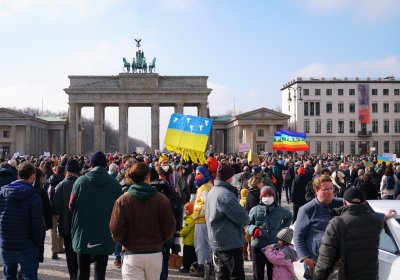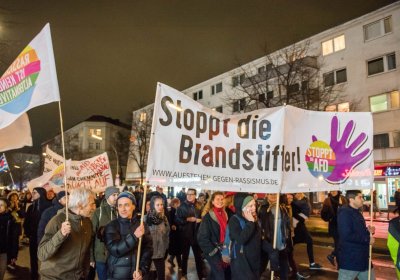Die Linke (The Left), Germany’s democratic socialist party, staged a huge upset in the capital, Berlin, winning 21.8% of the city’s vote in the February 23 elections. Marcel Cartier looks behind the party’s revival and the challenge in winning working-class support away from the far right.
Berlin
Berlin’s grassroots housing movement Deutsche Wohnen Enteignen (Expropriate Deutsche Wohnen, DWE) launched its new campaign on September 26 for a legally binding referendum to expropriate housing from corporate landlords, reports Ben Radford.
For Ukrainian refugees in Berlin, like those in Warsaw, Chisinau, and elsewhere, this war isn’t about support for Zelensky or NATO, writes Marcel Cartier. It is about defending their identity as Ukrainians.
Berlin’s referendum to expropriate corporate landlords is a watershed moment for rental politics and a rare win against international real estate capital, reports Thomas McGath.
We will not forget any individual killed by racist, anti-Semitic, anti-Roma, queerphobic, misogynistic, inhuman ideologies, nor the intellectual apologists sitting in parliaments stirring the fire, says Ferat Ali Kocak.
In the aftermath of the recent racist attacks in Hanau, Green Left spoke with Sibylle Kaczorek, an anti-racist activist based in Berlin, about its impacts on recent election results in Hamburg and the campaign against the far right.
The fear of collaboration by the so-called mainstream democratic parties with the far-right in Germany has been realised in the first such incident in post-war times, writes Sibylle Kaczorek.
In recent elections in two East German states on September 1, the vote for the far right was the highest yet, writes Sibylle Kaczorek.
Sibylle Kaczorek, a member of Germany’s main left party Die Linke and an activist with Aufstehengegen Rassismus! (Stand Up Against Racism!) was interviewed in May by Dick Nichols, Green Left Weekly’s European correspondent.
Sibylle Kaczorek, a member of Socialist Alliance and the Left Party, addressed the International Women's day rally in Berlin on behalf of Stand Up Against Racism (Aufstehen gegen Rassismus).
After the recent successful defence of the Hambacher Forest against the threat of destruction by coal giant RWE, more than 5000 people joined a mass civil disobedience action on October 27 and 28 in the coalfields of the German state of North-Rhein Westphalia (NRW).
The action was called by Ende Gelaende, an anti-capitalist environmental group committed to non-violent direct action tactics. It aims to win an immediate end to coal production at Europe’s biggest open-cast mine, the Hambach lignite (brown coal) mine.
- Page 1
- Next page











